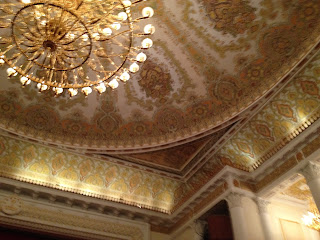So groggy and tired....Im roughly 30 hours into the process of leaving Tajikistan. I began preparing to leave Tajikistan roughly a week before
my departure.
I spoke for months about delaying my departure date; but when the time came to make a change
or payment, I didn’t have the motivation.
Additionally, I secured a 2-month internship in Houston and was heavily
encouraged by my parents to come home…so in the end…I left on June 20 – exactly
10 months from the date I started my grant. Given all the prior talk of leaving in July or August,
however, my departure felt early and rushed.
And even if I had delayed, I can’t feasibly expect going from life in Dushanbe to
life in America to feel seamless or completely natural.
So now, I am sitting in Terminal 7 at JFK, flanked by two
eateries selling quick, custom salads and across from my Starbucks Tall Vanilla
Iced Coffee (I waste no time).
Surely the fact that I have been awake and shuffling in security and
customs lines for over a day is adding to my delirium. But I can’t help looking around in awe and wonder. I shamelessly stumbled to the currency
exchange desk where to smartly dressed women greeted me with shiny
customer-service smiles (far cry from the pot-bellied Tajik men who stare
sleepily from currency exchange windows in Dushanbe). After inspecting their sign, I sheepishly asked, “Do you
really buy back all currencies like
it says here?” “Which currency do you have?” “Tajik Somoni.” The women chuckled, shook her head, and
apologized, “Oh sorry, we don’t.”
I thanked her and mentally congratulated her for not instantly recoiling
in confusion at the mention of such a strange and faraway place.
I am expecting odd looks soon enough when I arrive in
Texas. But now I still feel like
I’m at some kind of exhibition of American life in Dushanbe, and that by this
evening I’ll return to my crusty soviet-style flat to sleep for 10 hours. Then, I think, maybe tomorrow I’ll
present a lesson on “summer vacations in the USA” and then stop for borsch
downstairs. Reality check to self:
you can’t just talk about being American now, you must live it.
Earlier on, as we touched down at JFK Airport, the Turkish
political satirist next to me urged me to look at the window at “home.” I casually glanced over, but was unable
to simulate the thrill I felt when I arrived home after extended travels to
Syria and Jordan. Again, it
may have been the delirium and the draining, but epic, send-off I had in
Tajikistan.
I should recount said epic send-off. In Tajikistan, family is
everything. Even when young Tajik
mothers travel by taxi from Dushanbe to Qurganteppa for a week, they still get
an epic family send off: In-laws
waving, brothers honking, thumb-sucking nieces blinking goodbye. And that’s just a city 1.5 hours away. So when I left for America (at 4 AM this morning) I found 10 of my favorite students and my work colleague at the
airport toting small trinkets and souvenirs as gifts for me. How they convinced their parents to let
them out at that hour, I am not sure. They whirled around me from entrance to security
check like an adoring windstorm guiding me through the hectic check-in
procedure. In a gesture of
Dushanbe-style hospitality, the airport employees laughed off my sizeable
excess baggage fees. I guess even
they were touched by how many students came to see off the strange American
teachers.
There was thankfully little dysfunction in Taj and
Turkey. Even so, I was altogether
unprepared for the competency of workers at JFK airport. Each American employee had answers to
my questions. Everyone
anticipated my quick transfers.
And everyone spoke perfect (albeit heavily New York-accented) English. Welcome home to me.
I still have two remaining flights before I am really
home. I do not feel ready to
answer questions about Tajikistan tomorrow morning because I have not yet
processed the idea that I left (and because I want to sleep for 3 days
straight).
But I will try not to embarrass myself just yet by feeling
novel in my own hometown. And I will
have to remember not to over-romanticize where I just came from even though the
stark contrasts make it hard not to exaggerate.
Time to board.





















